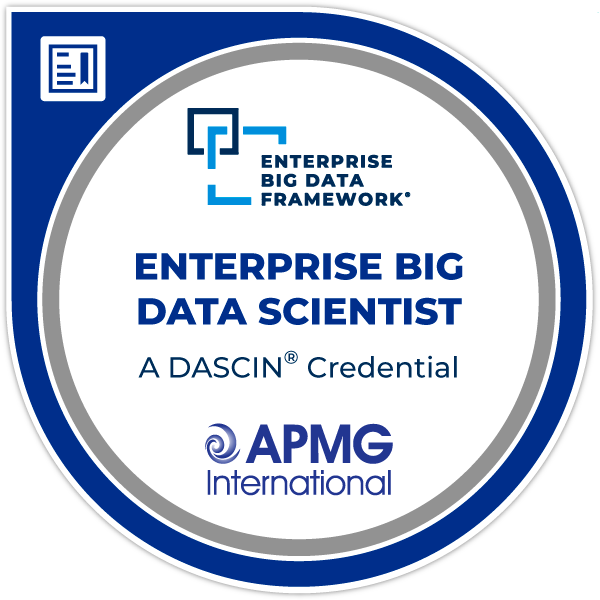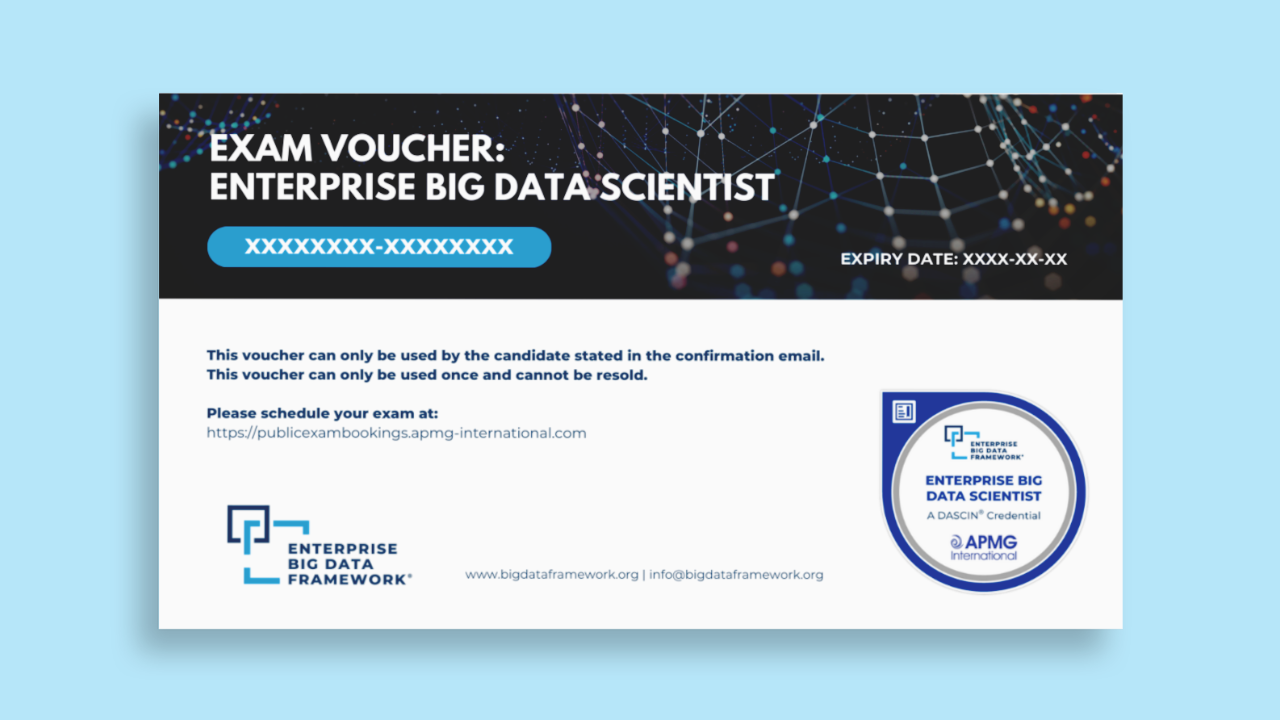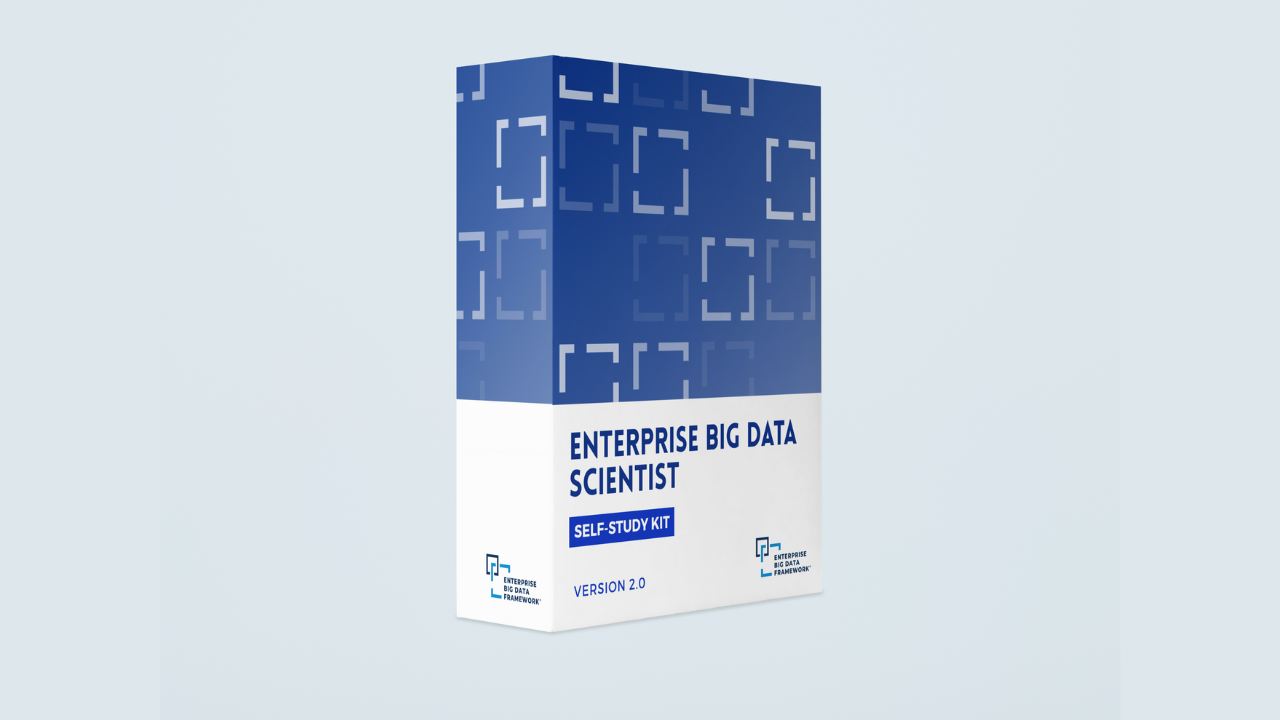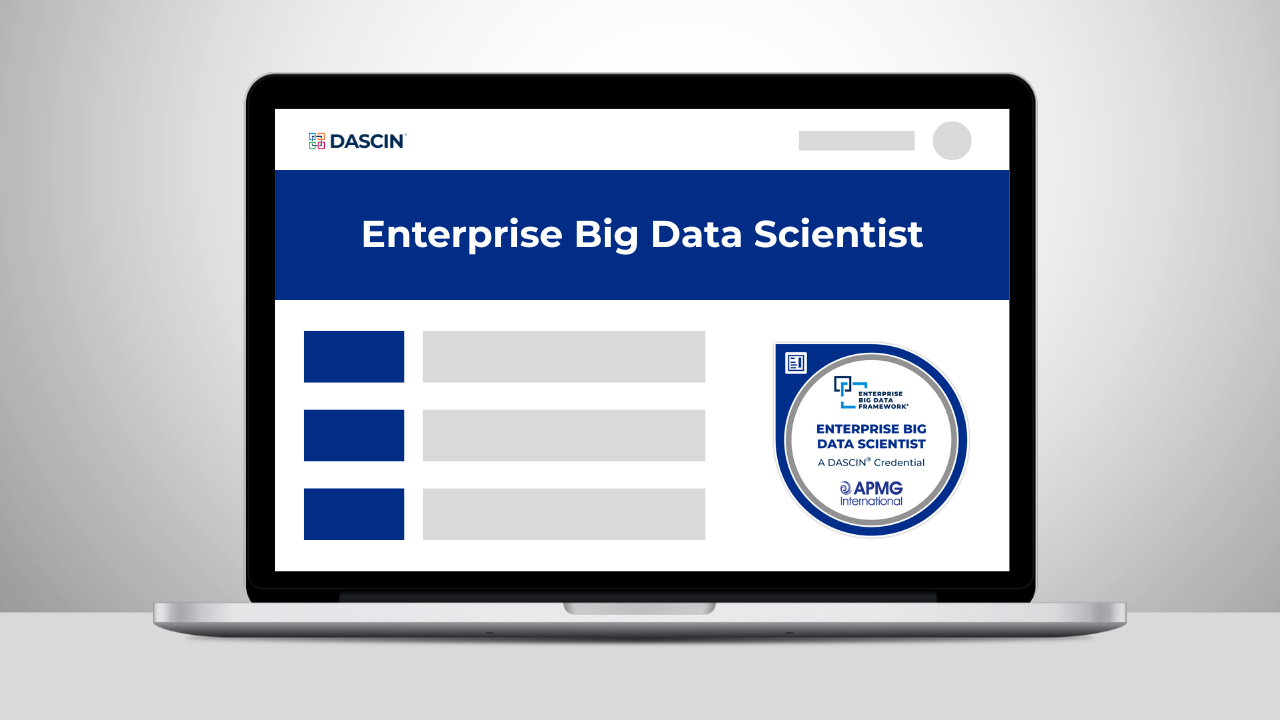Course Summary
The Enterprise Big Data Scientist (EBDS®) course is an in-depth program designed for prospective data scientists who want to gain a comprehensive understanding of the key concepts and techniques required to excel in the field. This course covers essential topics, including statistical modeling, machine learning, and data communication, providing participants with the theoretical foundation and practical tools needed to solve complex business problems with data. With a focus on both theory and hands-on learning, the course ensures that participants not only understand the underlying principles but also how to apply them in real-world scenarios.
Throughout the program, participants will dive deep into a range of critical areas, from statistical methods and machine learning techniques to data visualization and communication. The course emphasizes the importance of mastering algorithms such as supervised and unsupervised learning, deep learning, and other advanced data science techniques that are essential for handling large-scale enterprise data. In addition, learners will gain practical experience using Python (with brief use of R and SQL), enabling them to develop, evaluate, and refine data-driven solutions in a variety of business contexts.
This course is tailored for individuals who aspire to become proficient data scientists, with a strong focus on developing the skills needed to design and implement data models that drive business decisions. While programming skills are not the main focus, familiarity with Python and its applications is essential for interpreting results. By the end of the program, participants will be well-equipped to tackle complex data science challenges and ready to sit for the Enterprise Big Data Scientist certification exam.
detailed course Information
The learning objectives for the Enterprise Big Data Scientist Certification Program include:
- Advanced Machine Learning Techniques: Develop proficiency in a wide range of machine learning techniques, including supervised and unsupervised learning algorithms, deep learning architectures, and ensemble methods, to build predictive models and extract meaningful insights from complex data.
- Statistical Analysis and Model Evaluation: Acquire expertise in statistical analysis techniques and model evaluation methods to assess model performance, understand bias-variance tradeoffs, and optimize model parameters for accurate predictions and decision-making.
- Advanced Data Visualization and Communication: Learn advanced data visualization techniques and best practices for communicating insights effectively to stakeholders, utilizing tools such as Python, R, Power BI, and Tableau to create compelling visualizations and data-driven narratives.
- Distributed Systems and Big Data Technologies: Familiarize yourself with distributed systems and big data technologies, including cloud computing, distributed file systems, and processing frameworks such as Apache Spark, to efficiently handle and process large volumes of data in enterprise environments.
- Application of Data Science in Enterprise Contexts: Apply data science techniques and methodologies to real-world enterprise scenarios, including case studies across various industries such as consumer services, technology, healthcare, and alliance frameworks, to address business challenges and drive innovation.
- Ethical Considerations and Responsible Practices: Understand the ethical implications of data science and big data analytics, including privacy concerns, bias mitigation, and accountability, and adhere to responsible practices in data collection, analysis, and decision-making.
These learning objectives aim to equip candidates with the knowledge, skills, and competencies necessary to excel as Enterprise Big Data Scientists, enabling them to leverage the power of data-driven insights to make informed decisions and create tangible value within their organizations.
The Enterprise Big Data Scientist (EBDS®) course is designed to equip participants with the essential skills and knowledge required for advanced data science roles. The program is structured into four main modules, each focusing on key areas of data science and big data analytics. Delivered over 30 hours of instructor-led training, this course ensures participants develop both theoretical understanding and practical skills to tackle real-world data challenges.
Module 1: Statistics and Performance Metrics (SPM)
- Fundamentals of Statistical Analysis: Gain an in-depth understanding of core statistical techniques including hypothesis testing, probability distributions, and inferential statistics, essential for data-driven decision-making.
- Descriptive and Inferential Statistics: Learn how to apply descriptive statistics to summarize data and inferential statistics to make predictions and draw conclusions about data populations.
- Performance Metrics: Master key performance metrics used to evaluate model effectiveness, such as accuracy, precision, recall, F1 score, ROC-AUC, and other advanced evaluation metrics.
- Bias-Variance Tradeoff: Explore how to manage the bias-variance tradeoff to optimize machine learning models, ensuring generalizability and robust performance on unseen data.
- Hands-on Techniques: Apply statistical methods and performance evaluation techniques to assess and improve the performance of various machine learning models using real-world datasets.
Module 2: Artificial Intelligence and Modelling (AIM)
- Supervised Learning: Understand the principles and techniques of supervised learning, including regression and classification algorithms (e.g., linear regression, decision trees, SVM, random forests)
- Unsupervised Learning: Learn about unsupervised learning algorithms such as clustering (K-means, DBSCAN) and dimensionality reduction (PCA) to extract hidden patterns and structures from unlabelled data.
- Deep Learning: Dive into advanced machine learning techniques, including neural networks, convolutional neural networks (CNNs), and recurrent neural networks (RNNs), for tasks such as image recognition and natural language processing.
- Ensemble Methods: Explore ensemble methods like boosting, bagging, and stacking, which combine multiple models to improve accuracy and mitigate overfitting.
- Model Optimization: Learn how to fine-tune model parameters and apply techniques like cross-validation, grid search, and hyperparameter tuning to maximize predictive accuracy.
Module 3: Distributed Technologies (DST)
- Introduction to Big Data: Understand the challenges and opportunities of working with large-scale data, including storage, processing, and analysis of massive datasets.
- Distributed Systems and Architectures: Explore the fundamentals of distributed systems, focusing on how to manage and process data across multiple machines, ensuring scalability and fault tolerance.
- Big Data Technologies: Familiarize yourself with essential big data tools such as Hadoop, Apache Spark, and Kafka, which are designed to handle large datasets and perform distributed data processing.
- Data Processing Frameworks: Learn how to use distributed data processing frameworks like Apache Spark for real-time and batch processing of large-scale data.
- Cloud Computing for Big Data: Understand the role of cloud computing in big data analytics, and learn how to leverage cloud platforms (AWS, Google Cloud, Azure) for scalable and efficient data processing and analysis.
Module 4: Applied Data Science (ADS)
- Real-World Case Studies: Apply data science methods to solve real-world business problems in industries such as healthcare, finance, and e-commerce, with a focus on customer segmentation, predictive maintenance, fraud detection, and more.
- Data Science in Enterprise Contexts: Learn how data science is used in various business contexts to drive decision-making, optimize processes, and deliver actionable insights.
- Data Wrangling and Preprocessing: Gain hands-on experience in cleaning, transforming, and preparing data for analysis, dealing with missing values, outliers, and inconsistent data.
- Model Deployment: Understand how to deploy data science models into production environments, ensuring scalability and integration with business systems.
- Collaboration with Stakeholders: Develop the ability to communicate technical insights effectively to non-technical stakeholders through data storytelling and visualization.
This structured, hands-on approach ensures participants gain a comprehensive understanding of the core areas of data science, preparing them to take on advanced roles as Enterprise Big Data Scientists. Each module builds practical expertise, ensuring participants are ready to apply their skills in real-world enterprise settings.
- Data Scientists: Professionals already working in data science roles who wish to deepen their understanding of advanced concepts and techniques, particularly in the context of enterprise-level data analysis and decision-making.
- Big Data Analysts: Individuals responsible for analyzing large volumes of data within organizations, seeking to augment their skills and knowledge to tackle complex data challenges effectively.
- Machine Learning Engineers: Engineers and developers specializing in machine learning applications, aiming to broaden their skill set and proficiency in utilizing machine learning algorithms and methodologies for enterprise solutions.
- Data Engineers: Engineers involved in the design and maintenance of data pipelines and infrastructure, looking to broaden their knowledge of data science principles and techniques to enhance data processing and analytics capabilities.
- IT Professionals: Individuals working in IT roles within enterprises, seeking to understand the applications and implications of big data technologies and data science methodologies in optimizing business processes and driving innovation.
The EBDS qualification caters to a spectrum of professionals across various disciplines who are eager to leverage the power of big data and advanced analytics to unlock new opportunities and drive organizational success.
The Enterprise Big Data Scientist (EBDS®) exam is a comprehensive evaluation of candidates’ understanding of advanced data science concepts and their ability to apply these concepts in real-world scenarios. Key details of the exam include:
- Exam Format: Open-book exam with 80 multiple-choice questions, divided into 4 segments.
- Passing Criteria:
- Standard pass mark: 65% (52 correct answers).
- Trainer pass mark: 75% (60 correct answers).
- Duration: 150 minutes; candidates taking the exam in a non-native language receive an additional 30 minutes (total 180 minutes).
- Question Types: The exam includes classic questions, negatively worded questions, and select-evaluate tasks that require candidates to assess and select the best options from provided statements.
- Bloom’s Levels: The questions test higher levels of thinking, including analysis (Level 3), synthesis (Level 4), and evaluation (Level 5).
- No Negative Marking: Incorrect or unanswered questions do not incur penalties.
Candidates are encouraged to prepare using the Enterprise Big Data Scientist Guide to ensure a solid understanding of the theoretical and practical aspects of data science. This preparation will help candidates effectively apply their knowledge to solve complex business problems and excel in the exam.
Digital Badge

Course Details
Testimonials & Course Reviews
I have participated in many data science courses, but the EBDS program offers a level of depth and practical application that sets it apart. The course’s focus on deep learning, big data technologies, and model optimization techniques was particularly beneficial. It is perfect for professionals looking to refine their data science skills and tackle the growing challenges in data processing and analysis.
The EBDS program provides an excellent balance of theoretical knowledge and practical application. The modules on AI, machine learning, and big data technologies are vital for building advanced data science skills. The course’s focus on collaboration and communication with stakeholders is invaluable, as it’s essential to deliver data-driven insights in a business context. This program is an essential resource for those wanting to elevate their data science expertise.
The course’s practical focus on real-world scenarios allowed me to apply the techniques I was learning immediately. I particularly appreciated the modules on data cleaning and wrangling – skills that are often undervalued in analytics but are absolutely crucial for ensuring the quality and accuracy of the analysis. The course also delves deeply into the various machine learning models for classification and clustering, providing the hands-on experience needed to implement these techniques confidently. I now feel equipped to handle a broader range of analytical challenges, such as predictive modeling, anomaly detection, and more complex clustering tasks.
The EBDS program stands out because of its practical approach to data science. It covers a wide array of topics, from advanced machine learning to ethical considerations in data science. The hands-on projects are invaluable, providing participants with practical experience that will directly benefit their careers. I highly recommend this program for anyone serious about making an impact in the field of data science.
The EBDS program does an outstanding job of bridging the gap between theory and real-world application. The course’s emphasis on advanced machine learning techniques and big data technologies, like Apache Spark, is crucial for professionals who want to lead in the rapidly evolving data science field. The focus on statistical analysis and model evaluation ensures participants can apply robust methods to optimize model performance.
One of the key highlights of this program for me was the extensive use of Python labs. Python is an industry-standard language for data science, and the EBDS program uses it in a way that not only reinforces theoretical concepts but also provides real-world applications that can be directly implemented in a professional setting.
The Python labs are meticulously structured to allow participants to practice and implement a wide variety of advanced machine learning techniques, such as supervised and unsupervised learning algorithms, ensemble methods, and deep learning models. Each lab provides step-by-step instructions while encouraging participants to explore and experiment beyond the basics. This hands-on approach is crucial, as it allows learners to build predictive models, perform data analysis, and test different algorithms in a dynamic environment.
The EBDS program offers a deep dive into the essential skills needed for advanced data science roles. The modules on machine learning techniques, model evaluation, and distributed technologies were particularly valuable. The real-world applications covered in the course are critical for anyone looking to advance in the field of big data and analytics. This program provides a solid foundation for making data-driven decisions at scale.






